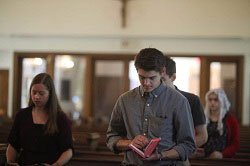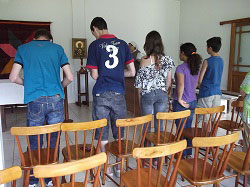

|
| Musical Musings: Liturgy |
|
|
Liturgy of the Hours in the ParishI. Value of Praying the HoursThe General Instruction on the Liturgy of the Hours reminds us:
14. Our sanctification is accomplished and worship is offered to God in the Liturgy of the Hours in such a way that an exchange or dialogue is set up between God and us, in which "God is speaking to his people … and his people are responding to him by both song and prayer."
You can see from the quote above how the Church feels about praying the Liturgy of the Hours. Here are five good reasons to pray the Hours yourself:
II. Liturgy of the Hours for AdultsAlthough we're not yet where we want to be (with daily celebration of Morning and Evening Prayer), the Parish of Saint James the Greater in Charles Town WV has taken steps that promotes the corporate praying of the Liturgy of the Hours. The only regularly scheduled Hours are on Wednesday. For over five years, the parish has enjoyed 24/7 Perpetual Adoration in a small adoration chapel that seats about 15. On Wednesdays, though, adoration is transferred during the day to the sanctuary of the main church. At 10:00am the Blessed Sacrament is transferred from the chapel to the main altar. Morning Prayer is prayed in Our Lord's presence, using a fairly simple format. All that is sung are the Hymn, the Benedictus (with antiphon), occasionally the Lord's Prayer, and a closing seasonal Marian Antiphon. The parish has about 30 copies of Christian Prayer, which are used. Ribbon placement is indicated by hymn boards; each ribbon to be used has a corresponding color card on the board, after which the page numbers are displayed. This practice has continued over the past decade or more, such that regular attendees are quite comfortable with the necessary "page flipping." Some even use thier own copy of Christian Prayer to pray the daily Office at home. When new people are noticed in the small congregation, extra verbal help is offered by the leaders, to facilitate prayer, which can be daunting to the uninitiated. The hymns are taken from the unfortunately limited selection of usable selections in Christian Prayer itself [one hopes this will be corrected in the revisions that are imminent]. The music for the Benedictus comes from Universal Music for Morning Prayer, published by CNP. Preceding the 7:00 Mass celebrated every Wednesday (which the 7th-9th grade Religious Ed classes attend as part of their evening), the parish schedules a Holy Hour. This time begins at 6:00pm with incensing the exposed Blessed Sacrament during a Eucharistic hymn. This is followed by the Angelus (or Regina caeli) and a devotion that rotates throughout the month [Quiet Meditation on the Eucharist (week 1); Divine Mercy Chaplet (week 2); Holy Rosary (week 3), Saint Joseph Novena (week 4)]. At about 6:20pm, Solemn Evening Prayer begins, with much more music than at Morning Prayer, using the Christian Prayer books and hymn board page numbers. The Introductory Dialogue and Hymn are sung; the Psalmody (with antiphons) is chanted stanza-by-stanza between cantor and congregation; The Responsory and Magnificat are sung. The celebrant (usually one of the parish deacons) chants the Closing Prayer, ending Evening Prayer. We omit the Blessing/Dismissal, since Benediction immediately follows. Universal Music for Evening Prayer is used for all the music. After another Eucharistic Hymn, Verse-Response, Prayer, Benediction and Divine Praises, "Holy God, We Praise Thy Name" is sung as the Blessed Sacrament is reposed back to the Adoration Chapel. Mass begins at 7:00pm. Several times a year, mostly for parish workshops, meetings, missions, or other special events, Morning Prayer or Evening Prayer is prayed on a larger scale. This most often takes a solemn form, with considerable singing. Because this takes place apart from adoration/holy hour/benediction, an organ processional and recessional are often used (except during Lent). Owing to a large pecentage of people who may be unfamiliar with the rubrics of the Divine Office, we almost always print a special booklet for these occasions. The Psalmody, Responsory and Gospel Canticle (with all their antiphons) are pointed according to the musical psalm tones included in the booklet. Sometimes this format is simplified, especially if the Office is prayed away from the church and musical accompaniment. In these cases, the Psalmody is often recited side-to-side rather than being chanted between cantor and full congregation. This affords people exposure to both styles, and regular attendees are very comfortable with either. A Solemn Tenebræ service is held on Wednesday evening of Holy Week, using the Office texts for the next day. The Psalmody for the Office of Readings is recited side-to-side; that for Morning Prayer is chanted alternately by choir and congregation. The Readings and an Extended Vigil are components of our Tenebræ, and the Benedictus is chanted by the full congregation as the last of the candles are extinguished. The drama of the removal of the lone Christ Candle from the sanctuary, the loud Strepitus, the Lord's Prayer and Closing Prayer in darkness, bring this popular service to a close. A substantial booklet was prepared and is re-used year after year. III. Children Can Pray, Too
The parish runs an extensive Summer Camp program during the months of June and July. Camp themes are wide and varied: Drama Camp; Sports Camp; Choir Camp; Lord of the Rings Camp; Star Wars Camp; Princess Camp; Altar Server Boot Camp, and many more. Most camps run for a week, Monday through Friday. Each day of camp begins with Morning Prayer in the main church. The volume used is Shorter Christian Prayer, which lacks all the options of the full version, but is much easier for youthful hands to navigate. We often simplify the choices, using as much from the Four-Week Psalter as possible, since all these psalms and canticles are found conveniently in Shorter Christian Prayer. An adult always leads (very often a parish deacon), but the children themselves begin the hymn and read the Reading. Over the years, the children have enjoyed this corporate prayer to begin their day and understand the format well. IV. ResourcesHere are some resources for understanding and actualizing Liturgy of the Hours in the parish.
Article written 07 October 2019 |
Submit Your Music / Contact Us / Company Description / Links
 10. Christ taught us:
"You must pray at all times and not lose heart" [Lk 18:1].
The Church has been faithful in obeying this instruction; it never ceases to offer prayer and makes this exhortation its own: "Through him (Jesus) let us offer to God an unceasing sacrifice of praise" [Heb 15:15].
The Church fulfills this precept not only by celebrating the eucharist but in other ways also, especially through the Liturgy of the Hours.
By ancient Christian tradition what distinguishes the Liturgy of the Hours from other liturgical services is that it consecrates to God the whole cycle of the day and the night.
10. Christ taught us:
"You must pray at all times and not lose heart" [Lk 18:1].
The Church has been faithful in obeying this instruction; it never ceases to offer prayer and makes this exhortation its own: "Through him (Jesus) let us offer to God an unceasing sacrifice of praise" [Heb 15:15].
The Church fulfills this precept not only by celebrating the eucharist but in other ways also, especially through the Liturgy of the Hours.
By ancient Christian tradition what distinguishes the Liturgy of the Hours from other liturgical services is that it consecrates to God the whole cycle of the day and the night.
 While we're happy with progress made in familiarizing the adults in the parish with the beauties of praying the Divine Office, we're thrilled that the youth are learning how to pray with the words of the Church, too.
While we're happy with progress made in familiarizing the adults in the parish with the beauties of praying the Divine Office, we're thrilled that the youth are learning how to pray with the words of the Church, too.